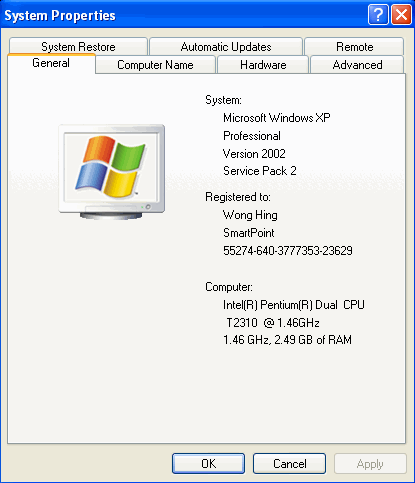|
"What is CPU ? It's Called The 'Brain' of Your Computer!"
|
|||||||||||||||||||||||||||||||||||||||||||||||||||||||||||||
| Manufacturer | Processor Type | Recommended Usage |
|---|---|---|
| Intel | Celeron | Basic computing," e-mail, home computers* |
| Celeron M | Laptop (notebook) computers | |
| Celeron D | "Value-priced PCs"* | |
| Pentium 4 | Digital home and office applications"* Image processing, games and multimedia | |
| Pentium M | High performance laptop computers | |
| Pentium D (Dual-core) | Multimedia entertainment, digital photo editing, running multiple applications, supporting multiple users | |
| Core Solo | Very-high-performance laptop computers | |
| Core Duo (Dual-core) | "Multiple demanding applications such as graphics-intensive games or serious number-crunching programs-while downloading music or running security programs in the background."* | |
| Core 2 Duo | High-performance energy-efficient desktop and mobile computers | |
| Xeon | Business applications, including Application servers, e-mail servers, Internet servers | |
| Itanium | "Business-critical computing with mainframe-class reliability"* | |
| AMD | Sempron | "Everyday computing with built-in security"* |
| Athlon 64 | "Leading edge performance with simultaneous 32-bit and 64-bit computing"* | |
| Athlon 64 X2 Dual Core | Running multiple applications simultaneously | |
| Athlon 64 FX | Running "the next generation of digital media and games"* | |
| Turion 64 | "Optimized to deliver AMD64 performance in thinner and lighter notebook PCs"* | |
| Turion 64 X2 | Multi-tasking, long battery life and compatibility with wireless and graphics technologies in high-performance laptops | |
| Opteron (multi-core) | Servers and workstations running simultaneous 32- and 64-bit computing |
CPU Speed
The speed of CPU is measured by frequency in Megahertz (MHz) or Gigahertz (GHz) with 1 GHz equals to 1000 MHz.
Example: 1.0GHz, 1.1 GHz, 1.13 GHz, 1.2 GHz, 1.3 GHz, 1.4 GHz, 1.5 GHz, 1.6 GHz, 1.7GHz, 1.8GHz, 1.9 GHz 2.0 GHz, 2.1 GHz, 2.2 GHz, 2.3 GHz, 2.4GHz, 2.53GHz, 2.6GHz, 2.8GHz, 3.0GHz, 3.2GHz, 3.4GHz, 3.6GHz or whatever latest.
As a conclusion, you should be able to answer the question - What is CPU? - The core component of your computer's operation. Everything else -disk drives, keyboard, mouse, monitor, and Internet connection, among others -is there either to provide instructions to the CPU, respond to data from the CPU, or both.
Can't find what you're looking for? Try Google Search!

|
|
Other Computer Training Links:
- Discover the Secrets Behind the Windows Vista Program
- Free Step-by-step Microsoft Office 2003 and 2007 Courses
- The Complete Guide to Setting up Network at Home or Office
- Internet Courses - Getting All The Possible Resources That You Can
- Your Ultimate Computer Data Backup and Recovery Training Course
- All You Needs to Know About Computer Viruses, Spywares, Malwares, Trojans, Worms, etc...
Back to Top
You're viewing the What is CPU info page, click here to go back to the Home Page
Google Search:

Free Newsletter
Get your free subscription below to download two ebooks and improves your computer skills or click here for details.
Then why not use the button below, to add us to your favorite bookmarking service?
| FREE E-books | Office 2007 | Office 2003 | Internet & E-mailing | Sitemap |
Microsoft Windows 7, Vista, XP, Microsoft Office Word, Excel, PowerPoint,
and Outlook are either registered trademarks or trademarks of
Microsoft Corporation in the United States and/or other countries.

